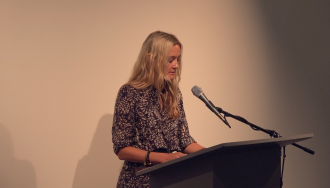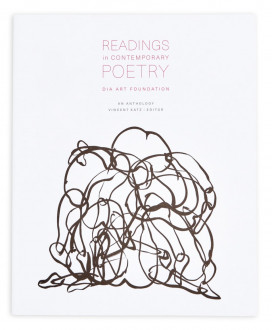Readings in Contemporary Poetry
Ann Stephenson and Carter Ratcliff
Tuesday, October 3, 2017, 6:30 pm, Dia Chelsea
Event Details
Tuesday, October 3, 2017, 6:30 pm
Dia:Chelsea
535 West 22nd Street, 5th Floor
New York City
Readings in Contemporary Poetry curator, Vincent Katz provided an introduction for the evening's reading.
Free for Dia members; $10 general admission; $6 admission for students and seniors
Advance ticket purchases recommended. Tickets are also available for purchase at the door, subject to availability.
Ann Stephenson’s publications include Wirework (2006), Adventure Club (2013), and The Poles (forthcoming). Some of her poems have appeared in Across the Margin, Brooklyn Rail, Delineator, Ladowich, Recluse, and Sal Mimeo, as well as the anthology Like Musical Instruments: 83 Contemporary American Poets (2014). She is the editor of Tent Editions, which will publish work by Marcella Durand and Carol Szamatowicz this fall. She received her MFA from Bard College in Annandale-on-Hudson, New York, in 2007, and curated the Ready Set Readings series at Whitespace Gallery in Atlanta in 2009–10. Stephenson is also the recipient of a New York Foundation for the Arts Artists’ Fellowship in poetry. She was born and raised in Georgia and lives and works in New York City.
Pennants Shone
A public service announcement
advised me to be myself
but that required a context
my interiority is buttoned up
it’s gonna be my neck
rolled up in batting
so I don't injure myself
more serums
for my teen skin type
messy in my entirety
to accommodate reality
referring to a glossary
the totality
of real things in the world
independent of my knowledge
or perception
a kind of existence
or universe
connected to or separate from
other kinds
Carter Ratcliff’s books of poetry include Fever Coast (1973), Give Me Tomorrow (1983), and Arrivederci, Modernismo (2007). His poetry has appeared in such journals as Baffler, Cimarron Review, La Presa, Sienese Shredder, and Vanitas. His first novel, Tequila Mockingbird, was published in 2015. Ratcliff received the Project for Innovative Poetry Gertrude Stein Award in 2005 and the first T-Space Poetry Award in 2013. An art critic as well as a poet, he has published his writing in many journals, including Art in America, Art Presse, Artforum, Artstudio, Modern Painting, and Tate Etc. He is also the editor of several books, such as The Fate of a Gesture: Jackson Pollock and Postwar American Art (1996) and Out of the Box: The Reinvention of Art, 1965–1975 (2000), and has contributed to monographs on Andy Warhol, Gilbert & George, Nabil Nahas, Georgia O’Keeffe, Kit White, and others. Ratcliff has taught at New York University, the City University of New York’s Hunter College, and the New York Studio School. He has received a Poets Foundation grant, several National Endowment for the Arts grants, a Guggenheim Fellowship, and the College Art Association’s Frank Jewett Mather Award.
Cult Status
Why not just
cut to the chase and grant cult status to obsession itself?
There’d be the midnight showing,
then dawn and the first day of the rest of obsession’s wretched life.
Then the near-death experience of 3 a.m.,
the white light of wondering if maybe
the entire system
could be made to understand that already, long ago, when god was a boy,
it had stumbled onto a way to short-circuit itself.
I mean, obsessing about obsession is a double negative, right?
What could be more positive,
more life-affirming, as they used to say,
when starvation had cult status and so did fire and dust and the green embers
of moss that aligned themselves with the edges of the flagstones.
There was a clavicle cult and a cult devoted to knock-knock jokes.
Who’s there? Who isn’t? The cult of everyone and his brother
was rivaled only by the cult of wanting to be alone, wanting to be alone
with everyone else who wanted to be alone.
Some were obsessed with Parmenides or Krispy Kreme,
and those who could think of nothing but the uncertainty principle
and getting their mitts on more and more uncertainty principle memorabilia
found that their thoughts either did or did not fill all of heaven
with an aurora borealis of insatiable need.
There was no room for thoughts
of obsession itself. Those were simpler,
more innocent times, as they used to say, when things were really complicated
by my memory of the way the very idea of cult status had really loved you,
everything had really loved you,
even the crush had loved you. Really, truly loved you
and what it really, truly loved was to hate the difference between love
and obsession, which is what made the world go round,
and what made it go away
was the knowledge that you would, soon, and so
what choice did I have? I made lateness my truest love
and soonness my obsession, my raison d’être, the object of my cult.
Books
Readings in Contemporary Poetry: An Anthology
Explore
Ann Stephenson Audio from Readings in Contemporary Poetry
Move to Ann Stephenson Audio from Readings in Contemporary Poetry pageCarter Ratcliff Audio from Readings in Contemporary Poetry
Move to Carter Ratcliff Audio from Readings in Contemporary Poetry page

